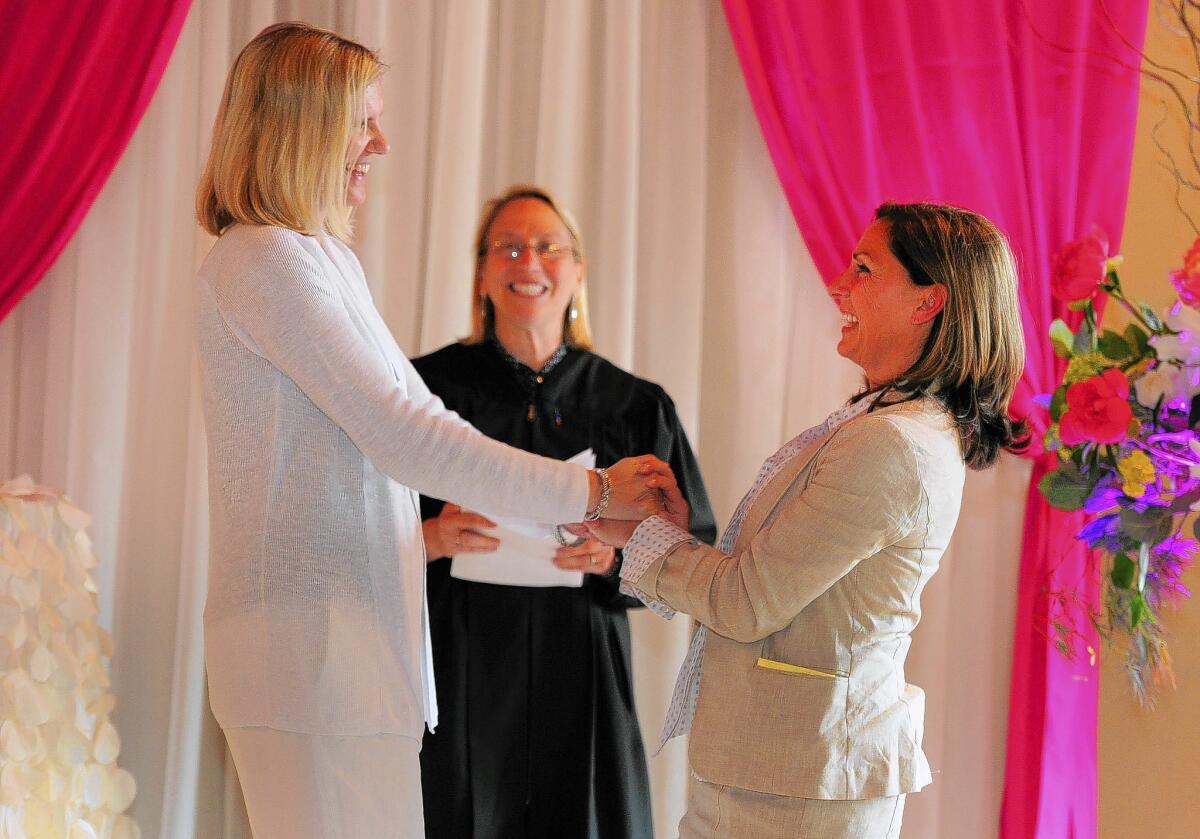Same-sex couples marry in Oregon as judge strikes down state ban

For Portland attorney Julie Engbloom, “the biggest stress of the last 48 hours” wasn’t waiting for U.S. District Judge Michael McShane to decide whether to overturn Oregon’s ban on same-sex marriage.
It wasn’t whether she had popped the question to the right woman — Laurie Brown has been her partner for 10 years.
“I have no doubts in Laurie,” Engbloom said Monday. “I have very little doubt in Judge McShane. ... The biggest question was, ‘Oh, my God, what to wear?’”
Engbloom and Brown were among the first same-sex couples to wed Monday, tying the knot within an hour of McShane’s noon decision that Oregon’s law was unconstitutional and left the four couples who sued to overturn it “feeling degraded, humiliated and stigmatized.”
In a 26-page decision that was equal parts poetic and personal, McShane said that tradition was no defense for discrimination and that “the well-being of Oregon’s children is not enhanced by destabilizing and limiting the rights and resources available to gay and lesbian families.”
He acknowledged that many Oregon residents worry that, by allowing gays and lesbians to marry, “we are going down a slippery slope that will have no moral boundaries.”
“To those who truly harbor such fears, I can only say this,” McShane concluded: “Let us look less to the sky to see what might fall; rather, let us look to each other … and rise.”
Since the U.S. Supreme Court struck down part of the federal Defense of Marriage Act last summer, not a single federal judge has ruled in favor of state same-sex marriage bans.
Other recent bans to fall include Idaho’s, which was struck down six days before McShane’s ruling. Idaho Republican Gov. C.L. “Butch” Otter has appealed the ruling, and weddings there are on hold. Five federal appeals courts are presiding over nine marriage equality cases nationwide, according to the Human Rights Campaign website.
The four couples who brought the legal action in Oregon sued Democratic Gov. John Kitzhaber, Atty. Gen. Ellen Rosenblum and other officials. But Rosenblum announced in February that she would not defend the ban, which voters approved in 2004.
The Washington, D.C.-based National Organization for Marriage filed to intervene in the case and “preserve the natural, one-man/one-woman definition of marriage.” But McShane ruled last week that the group did not have standing in the state case. The group is appealing that decision.
The organization filed an emergency request, asking that the U.S. 9th Circuit Court of Appeals stop McShane from filing his decision and, therefore, halting any same-sex weddings from taking place in Oregon on Monday. The 9th Circuit denied the request.
Teresa Harke, a spokeswoman for the Oregon Family Council and an opponent of same-sex marriage, said Monday would be remembered as “a tragic day for Oregonians and our cherished system of representative government.”
Applauding the National Organization for Marriage, Harke said in a statement that “while tonight’s newscast will feature tearful couples at staged PR activities in courthouses across the state, the real tears should be for the next generations as we witness our Constitutional Republic sink into a Banana Republic.”
At the Portland headquarters of Oregon United for Marriage, the tenor was jubilant. The organization has gathered enough signatures to put a measure on the November ballot to repeal Oregon’s same-sex marriage ban — work that now is probably unnecessary.
“The coalition will decide probably on June 2 whether or not to go forward with the ballot measure,” said David Fidanque, executive director of the ACLU of Oregon. “It is unlikely we will.”
During a post-decision news conference and celebration, Fidanque told the happy crowd that “this day has been a long time coming.”
“There are different standards for determining whether a law or a state constitutional provision passes muster under the Equal Protection Clause” of the U.S. Constitution, he continued. The ACLU represented two of the couples who brought the suit, and “we argued and the state of Oregon argued that Oregon’s marriage ban could not withstand review under any standard.”
On Monday, McShane agreed, Fidanque said, before reading from what he called “one particularly important part” of the ruling: “The relationship between prohibiting same-gender couples from marrying and protecting children and promoting stable families is utterly arbitrary and completely irrational.”
Oregon United for Marriage had booked a ballroom not too far from the Multnomah County building where couples could wed after receiving their marriage licenses.
Engbloom and Brown — who were not involved in the legal action — lined up for a license more than four hours before the ruling and were the first to get hitched at the Melody Ballroom. Family and friends had traveled to share the day with them.
“We’re drinking champagne and going out to dinner to one of our favorite restaurants. I’m going to try not to go to work tomorrow,” Engbloom said. “We have no honeymoon planned. We’ll work on that later.”
More to Read
Sign up for Essential California
The most important California stories and recommendations in your inbox every morning.
You may occasionally receive promotional content from the Los Angeles Times.










